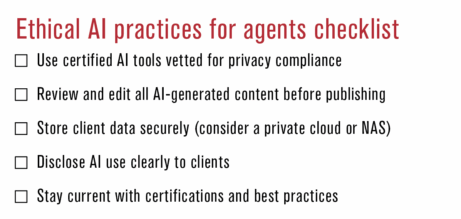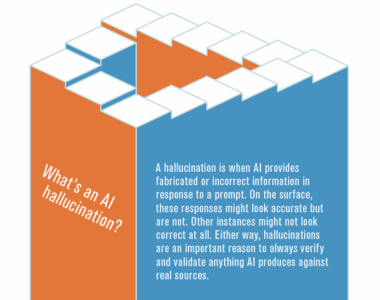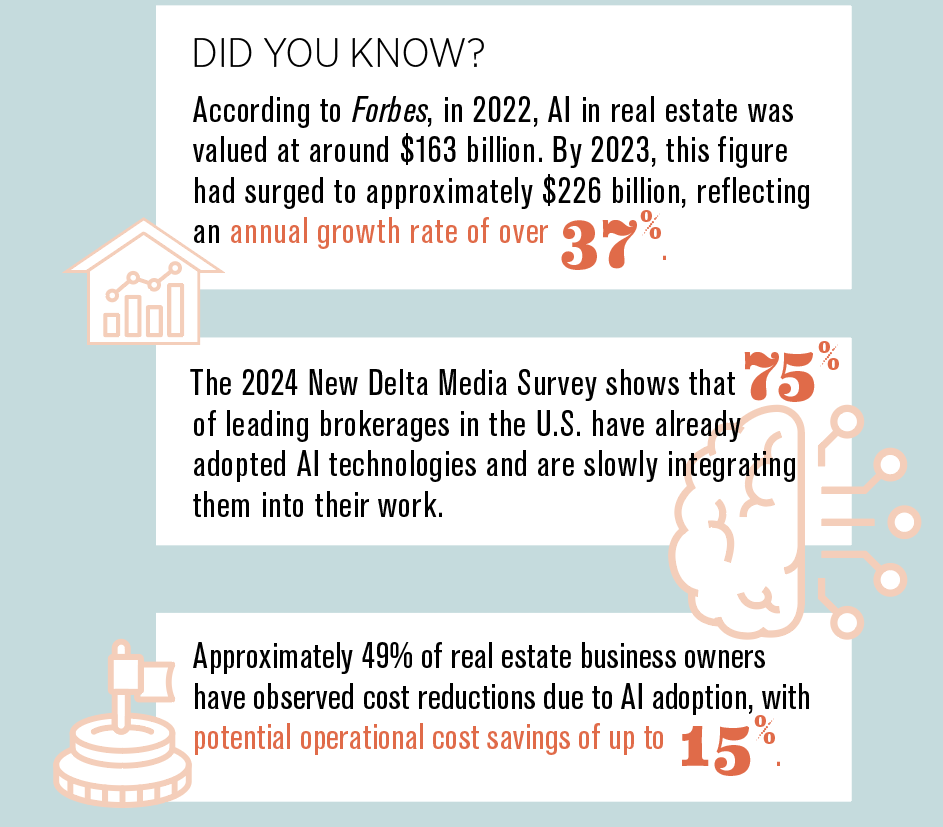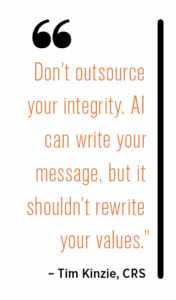By Keith Winkler
Artificial intelligence (AI) is transforming the way residential real estate professionals work—streamlining marketing, enhancing lead generation and simplifying administrative tasks.
But as this powerful technology becomes more common in the industry, it raises serious ethical questions and data privacy concerns.
“AI is here to stay, and it’s only going to continue to grow exponentially,” says Tim Kinzie, CRS, owner and founder at Montlor Luxury Realty in Cary, North Carolina. “It’s a tool that can absolutely multiply our potential—but only if we use it responsibly.”
Here’s what every agent needs to know to stay ahead of the curve and ensure ethical, secure use of AI tools.
Know the laws before you leverage AI
AI may feel like a futuristic bonus, but its use in real estate is subject to very real—and evolving—legal considerations. From the federal level to state laws, agents must ensure that their tech practices comply with data protection standards. Even if third-party tools handle the heavy lifting, agents are still responsible for how client information is collected, stored and used.
Disclosure, a familiar concept for anyone licensed in real estate, is central here.
“We’re taught to disclose any material fact,” says Kinzie. “Why wouldn’t that extend to AI-generated content? If an AI writes something and the agent doesn’t disclose that, it’s not just an ethical lapse—it could become a legal liability.”
The concerns extend beyond AI “hallucinating” false or inaccurate information—failing to disclose any AI involvement may soon be regulated. “I believe laws around disclosure are coming,” Kinzie adds. “It’s better to get ahead of that now than to be caught off guard later.”
Protect client data—before it’s too late
Real estate professionals handle a trove of sensitive client data, from contact details to financial documents. As AI tools increasingly access and analyze this information, agents must take extra steps to secure it.

“There’s no perfect protection,” Kinzie admits, “but you need to be proactive. Something as simple as relying entirely on Dropbox or Google Drive can be risky.” He suggests alternatives such as a NAS (network-attached storage) system—essentially a private cloud—to add an extra layer of security. “Think of it like cold storage for data, similar to what’s used in cryptocurrency.”
With AI-assisted platforms emerging in MLS systems to analyze contracts and patterns of behavior, concerns about surveillance and data misuse are growing. “If your clients’ data is being ingested and analyzed without proper protections,” Kinzie warns, “you could be violating their trust—and your fiduciary responsibility.”
Be transparent with clients and stay ethical
One of the biggest risks in using AI is the temptation to let it take over client communication. While it may be efficient, it can easily cross ethical lines if clients aren’t informed.
“Using AI to write listing descriptions or email responses is fine,” Kinzie says, “as long as you’re clear about it. Frame it as a benefit—tell your clients you’re using AI to optimize their listing with current buzzwords or market data. That’s a positive.”

What’s not okay, Kinzie stresses, is allowing AI to manufacture a voice that isn’t your own—or to cover for lack of experience. “Newer agents using AI to coach them through negotiations might sound polished, but they don’t always understand the substance of what they’re sending. That’s dangerous.”
Prepare for what’s next: regulation is coming
There’s still no national standard for AI regulation, but change is coming. Discussions are underway in multiple states about requiring disclosures, consent and data reporting for AI applications in consumer industries, including real estate.
Meanwhile, some MLS platforms are piloting programs that would require agents to upload contracts into AI-analyzed systems. That raises major concerns about client confidentiality.
“It’s not about having something to hide,” says Kinzie. “It’s about protecting our clients. That’s one of our core responsibilities as brokers.”
Agents should keep a close eye on local legislation, NAR updates and professional development opportunities to stay informed and compliant.

Get certified, stay competitive
Completing a certification program is one of the best ways to demonstrate a commitment to ethical AI use. The Residential Real Estate
Council’s AI Certification offers agents a professional foundation to understand how to use emerging technologies without compromising client trust.
“Anyone can prompt a chatbot to write a blog post,” Kinzie says. “But being able to explain how the tool works—and how it protects your client—is what separates you from the pack.”
Real estate is still a relationship business
AI may level the playing field in some ways, but it won’t replace the agent who shows up with integrity, expertise and empathy. As Kinzie puts it: “Real estate is still one of the last true relationship-driven industries. AI can enhance your work—but only if you understand it and use it wisely.”










